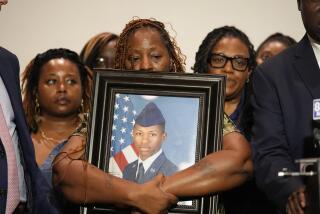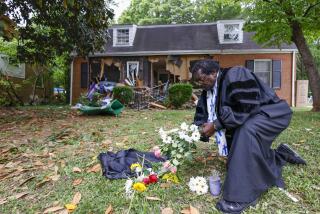LAW ENFORCEMENT : Shootout Wounds Image of Atlanta Police : Witnesses say an officer deliberately killed an injured customer in a confused raid. Passions are inflamed by charges of ‘coldblooded murder’ and other scandals.
- Share via
ATLANTA — From the start, it was clear that the gunfight last month at a downtown motorcycle shop was a highly unusual event. Plainclothed police officers burst in, guns already drawn, catching customers and employees by surprise. Gunfire erupted out of nowhere. When the shots subsided, an officer and another man lay wounded. One customer was dying.
The officers said they thought a “suspicious” man they had been watching was robbing the shop. An employee mistook the cops for robbers and yanked out his weapon in self-defense.
But that tragically Tarantino-esque tableau was just the start. Three witnesses later came forward who say they watched a police officer stand over a wounded man cowering on the sidewalk and, in broad daylight, execute him.
Later, the dead man’s mother accused the police of covering up a coldblooded murder.
Last week, a month after the shooting and after a fourth witness said he saw the killing, Atlanta Police Chief Beverly Harvard suspended one officer, citing inconsistencies in his story. Mayor Bill Campbell announced that the case will go to the district attorney and U.S. attorney for possible criminal charges.
But the monthlong drumbeat of allegations, along with public protests and censure by members of the city’s old civil rights establishment, has shaken the public’s confidence in the police department, especially coming on top of a corruption scandal.
Now Atlanta, a largely black city that has had black mayors and police chiefs since the late 1970s, finds itself confronting the same kinds of problems that have beset such cities as Los Angeles, Philadelphia and Chicago, where brutality charges have been leveled against white officers by black citizens. But in the Atlanta case, both the police officers and the victim were African American.
“Atlanta is no different” from those cities where police officers have been accused of using excessive force, charged state Rep. Tyrone Brooks, a longtime civil rights activist who has participated in past surveys of police departments for the Southern Christian Leadership Conference.
Citing cases from the 1980s, Brooks added: “You don’t get real community concern and involvement unless it’s white on black or black on white [violence]. If [this latest shooting] was white on black, we would be going crazy. We’d be tearing up this whole damn town.”
The SCLC, the Rainbow Coalition and the Georgia Assn. of Black Elected Officials have asked the U.S. Justice Department to investigate the shooting, which they have called “coldblooded murder.”
The investigation of the Dec. 7 shooting by local officials was badly handled. Potential witnesses were not interviewed for a month.
The medical examiner at one point told reporters that an autopsy supported the witnesses’ story that the victim, 23-year-old Jerry Jackson, was shot by someone standing above him firing down. Later he hedged, saying that both the witnesses and the police could be telling the truth.
Meanwhile, the Atlanta Constitution reported last week, records show that the police have been referring cases of police shootings to the district attorney’s office but that officials there had no idea what had become of them.
The department also has been damaged by a corruption scandal involving officers who demanded money from drug dealers in exchange for protection. Two officers have been convicted, two have pleaded guilty and two are awaiting trials on federal charges.
In addition, two officers were convicted in 1993 for their involvement in a crime ring that committed robbery and murder.
There has been no suggestion, however, that this shooting is connected to any criminal activity.
At a press conference, Campbell said “it would be extremely unfair for anyone to use this tragic incident to indict by implication the men and women of the Atlanta Police Department.”
But Brenda Jackson, the victim’s mother, said she believes the city has been trying to cover up her son’s murder.
“I am angry,” she said last week. “I do not trust our City of Atlanta Police Department . . . “
In a public apology on Jan. 3, Police Officer Waine L. Pinckney, whose gun apparently fired the fatal shots, called the incident “the biggest nightmare I’ve ever had in my life” and said he never intended to shoot Jackson.
It all began, the three-year department veteran said, when his partner, W. T. Sauls, was fired upon while investigating four people he considered suspicious.
“I returned fire,” Pinckney continued, saying that he shot twice at the man he saw firing a gun. “I have since been told that my two bullets struck the brick or cement and fragmented. Four of those bullet fragments apparently struck Mr. Jackson.”
But when Harvard suspended Pinckney Sunday, she cited inconsistencies in Pinckney’s statements to investigators. “The concern that I have . . . is that we have an officer who has said that he was shooting at one thing . . . [and] whose bullet struck somewhere not near where he said he was shooting.”
More to Read
Sign up for Essential California
The most important California stories and recommendations in your inbox every morning.
You may occasionally receive promotional content from the Los Angeles Times.













